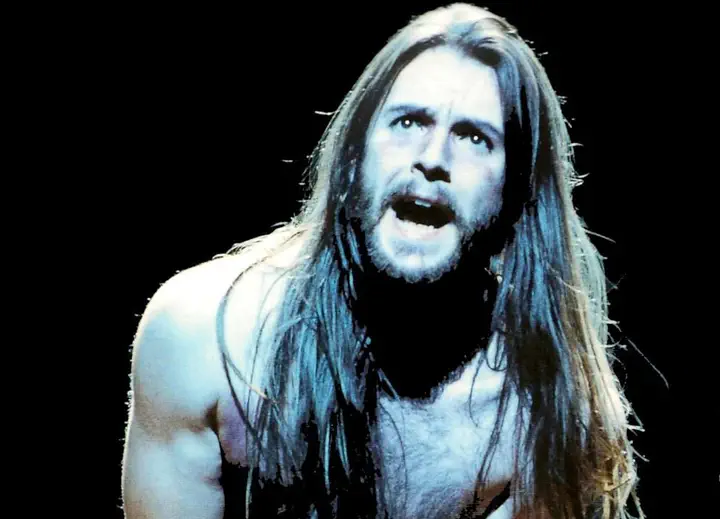Because I got high #2
On the G5 in Jesus Christ Superstar’s Gethsemane

In my [previous post] (../tenor_high01/) in this series, I selected short excerpts of operatic tenors singing high notes. Today we momentarily leave opera aside to focus on (very) high notes by male voices in other genres. I could talk about this topic forever, so I’ll try not to stray too far away from a very specific case: the high G5 in the rock opera Jesus Christ Superstar (JCS) on the word “Why (should I die)” in the song Gethsemane.
I’ll start, as often, with a personal anecdote. In 1996-1997, I spent a year in London. One day I turned on the TV and saw a live rendition of Gethsemane by the man who was playing the lead role in the London revival of JCS, Steve Balsamo. I can’t remember exactly if it was this performance or that one, but it had such an impact on me that I bought a ticket for the show and the CD of the recording by the 1996 London cast soon after that.
The CD is one of my all-time favourites. Brilliant vocals. Excellent music: catchy tunes and grooves, with a wide emotional spectrum ranging from the stressful (e.g. odd time signatures) to the soothing (Joanna Ampil’s voice) - and sometimes mixing the two (e.g. Everything’s alright when Ampil’s maternal voice contrasts with the underlying 5/4 rhythm of the song that leads us to expect that everything’s not going to be alright!). Zubin Varla should also be acknowledged for his thunderous vocals as Judas. And of course, Jesus (Steve Balsamo)’s vocals shine throughout.
The first obvious feature of Balsamo’s voice that appealed to me was its pitch range. I was very much into Glenn Hughes at that time (a veteran hard rock singer of Deep Purple fame known for his powerful high notes which he has managed to preserve to this day). Examples of Balsamo’s high notes from this recording can be found in What’s the buzz?" when Mary Magdalene (J. Ampil) tries to “cool down [his] face a bit”:
SAMPLE 1:
Another example occurs during the “cleansing of the Temple”:
SAMPLE 2:
And of course, the climax in Gethsemane: first the high G5 on “Why should I die” and then the ascending “See how I die” leading to another G5. There are quite a few concert versions to choose from on Youtube; but recently an amateur video from an actual performance of the rock opera by Balsamo in the late 1990s was posted:
SAMPLE 3:
But Balsamo’s high notes should not overshadow his other exceptional qualities: a very good technique, the ability to sing equally well from piano to fortissimo, and, my favourite very subjective one: his extremely rich and pleasant timbre particularly salient on some notes in his mid-range, and, for some reason, with the vowel /e/… For instance, the /e/ in the word “every” here:
SAMPLE 4:
Or the word “dead” at the end of this short excerpt:
SAMPLE 5:
I have yet to find an explanation why I like the sound of these notes so much, and I must say I’d love to analyze acoustically the dry lead voice track from the recording… Ok, back to the high G, and the genesis, no pun intended, of JCS.
In 1969-70, composer Andrew Lloyd Webber and lyricist Time Rice were invited to listen to the rough tapes of Deep Purple’s forthcoming album featuring their new singer, Ian Gillan, singing Child in time. In his autobiography, Unmasked: A Memoir, Lloyd Weber recalls: “The moment I first heard the famous Ian Gillan primal scream was the moment I found my Jesus […] I went back to my flat and rewrote the moment Jesus slings the moneylenders out of the temple” (this is the bit in SAMPLE 2, sung by Steve Balsamo). And here’s the legendary passage from Child in time that probably sparked Lloyed Webber and Rice’s enthusiasm (I chose a live version because the voice is rawer than in the studio):
SAMPLE 6
Lloyd Webber writes he had considered Colin Blunstone (the singer of the Zombies) for Jesus, but their label refused the permission. Jesus would have been very different, had Blunstone sung Jesus’ part instead of Gillan. Gillan’s autobiography, Ian Gillan - The Autobiography of Deep Purple’s Lead Singer states that he was chosen over Robert Plant (neither Lloyed Weber’s book, nor P. Rees’ Robert Plant: A Life mentions this…). Sorry, back to the G5.
It is said that the G5 on “Why (should I die)” in Gethsemane was not written in the score and Gillan improvised it. Now, as happens with all unwritten climatic high notes in opera (e.g. the high C in the aria Di Quella Pira from Il Trovatore, see [previous post] (../tenor_high01/)), once some singer has established the tradition, it is hard not to sing the note. G5 being an extremely high note that very few male singers can produce (because of physiological limitations, no matter how much training), if the G5 in Gethsemane has become indispensible, then it means that many excellent singers can’t sing Jesus part.
So we’ve already listened to Steve Balsamo’s G5; here is the one that started it all (by Ian Gillan):
SAMPLE 7
JCS premiered on Broadway in 1971 with Jeff Fenholt (incidentally, he later recorded unreleased vocals for Black Sabbath - Gillan also officially sang for Sabbath: it’s a small world!) but the man who will forever remain the prototype for Jesus is Ted Neeley, presumably because he was Jesus in the 1973 movie, as Lloyd Webber puts it: “Ted Neeley, Jeff Fenholt’s Broadway understudy, was the movie’s Jesus, Jeff having shacked up with Salvador Dalí’s wife after Señor and Señora Dalí had met him backstage”.
Neeley has sung the role until very recently; (mostly amateur) footage is available on Youtube showing Neeley belting out the G5 even much later in his career. The following clip shows the most iconic G5 in the history of rock operas:
SAMPLE 8